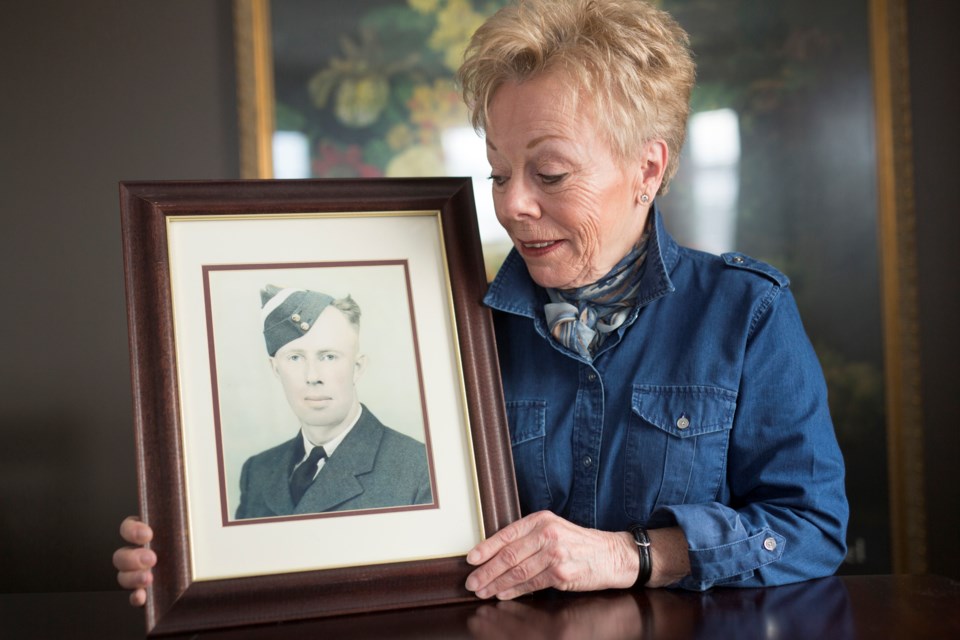Remembrance Day means a lot to Olds resident Heather Brooks because her dad, Robert “Bob” Brooks, was shot down and spent two years in a prison camp in Germany during the Second World War.
Bob Brooks passed away about 20 years ago. He enlisted in the Royal Canadian Air Force and served as a gunner in a Halifax bomber. “Apparently everybody was pretty surprised when he joined up,” Heather says.
“He was a very shy man, a very quiet man. But there was a lot underneath that shyness, that quietness, obviously you know; survived two years in a prison camp.”
The plane was shot down on its way back to Britain from a bombing raid in Berlin. Two of the seven crew members were killed. Germans hunted down the rest.
When the plane was hit it was bedlam.
"The plane’s on fire. There was apparently a hatch up in the cockpit but he couldn’t get out of it because the fire was so bad,” Heather says.
“Dad was the last one out of the plane. The pilot had already left. He was trying to radio the other guys. He was trying to radio the tail gunner and the tail gunner wasn’t replying to him. Dad didn’t know the tail gunner was already dead. That’s why dad was the last one down.”
Brooks landed on the edge of Mando, a little island off the coast of Denmark.
When he landed, Brooks had no idea where his crewmates were – whether they were alive or dead.
After a couple of days of hiding and wondering what to do, he walked up on to a field from a dike at the edge of the island. As he did so, Brooks met two Danish farm boys about 13 and 15 years old who were milking cows.
In 2000, Heather travelled to Mando to thank those who helped and hid her father. She came across one of those two guys who initially met her father.
“He told me that because dad hadn’t eaten for a few days, he drank about, he said, about three pails of milk,” she says, adding those pails aren’t as large as the ones on farms here.
The two boys hid Brooks in a little wagon and took him to a town on the island so he could be looked after by others.
Brooks was hidden and fed by residents for about three weeks, moved from place to place.
“They hid him in the loft of a bakery, they hid him in a culvert, very large – big wooden doors on them. They hid him in haystacks,” Heather says. “He started to get sick – a really bad cold – because of all this moving around."
The islanders buried Brooks’ parachute and all his clothes and gave him Danish street clothes to wear so if he was spotted he’d look like a Danish resident.
When Heather was in Denmark in 2000, the daughter-in-law of one of the people who had hidden her father showed her a picture of a baby in a christening gown.
“I kept thinking, ‘she must just be showing me pictures of her grandchildren.’
“The interpreter finally said ‘she’s trying to tell you that the christening gown on that baby was made from the silk from your father’s parachute.’
“Still makes her emotional after all these years,” she says.
After three weeks, the Germans were getting very frustrated because they hadn’t found Brooks.
“So then the Germans decided they were just going to shoot everybody on the island because they knew he must be there somewhere and nobody would tell them where he was,” Heather says.
Her father found out, and decided to get across to the mainland with the idea of meeting someone in the underground in Sweden.
But he was betrayed by Nazi sympathizers.
He ended up in Stalag 4B in the Black Forest in Germany.
“He would see trainloads of women and children – He knew they were certainly Jewish and he knew where they were going – to the gas chambers,” Heather says.
She also found several letters, including one in which the wife of one of the prisoners hoped guards would stop shooting prisoners.
At one point, the prisoners decided to dig a tunnel starting from under the mess hall in order to escape. All the huts were on stilts. But they needed a way to block the space under the mess hall so the guards couldn’t see what they were doing.
The prisoners were allowed to play soccer. They told the guards they needed to pile dirt up around the building so they wouldn’t keep losing their soccer ball under it.
But the guards discovered the tunnel.
“What they did was they filled it with the contents of the latrines. You really want to crawl out through that – literally crap,” Heather says.
The prisoners also made a radio. Her dad volunteered to hide it because he was the only single prisoner in the hut.
“If that had ever been found, he would have been shot right there. But he just figured ‘these guys have kids, I’m not even married, I’ll take the risk,’” she says.
The Russians finally liberated the camp in 1945.
“He lost an awful lot of weight,” Heather says. “I’ve got a picture.”
Brooks eventually went back to farming in Manitoba and hardly ever talked about his experiences in the war.



